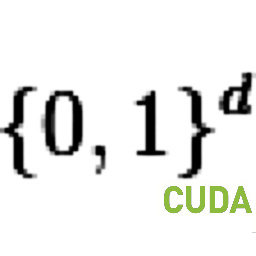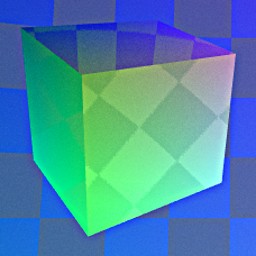CUDA at other sites
Bruteforcing Countdown numbers game with CUDA(19th April 2023) |
|||||||
|
Youtuber Another Roof posed an interesting question on his video "The Surprising Maths of Britain's Oldest* Game Show". The challenge was stated in the video's description: "I want to see a list of the percentage of solvable games for ALL options of large numbers. Like I did for the 15 options of the form {n, n+25, n+50, n+75}, but for all of them. The options for large numbers should be four distinct numbers in the range from 11 to 100. As I said there are 2555190 such options so this will require a clever bit of code, but I think it’s possible!". His reference Python implementation would have taken 1055 days (25000 hours) of CPU time (when all four large numbers are used in the game), but with CUDA and a RTX 4080 card it could be solved in just 0.8 hours, or 31000x faster!
|

|
||||||
Very fuzzy searching with CUDA(2nd November 2015) |
|||||||
|
This is an alternative answer to the question I encountered at Stack Overflow about fuzzy searching of hashes on Elasticsearch. My original answer used locality-sensitive hashing. Superior speed and simple implementation were gained by using nVidia's CUDA via Thrust library.
|

|
||||||
Real-time interest point tracking(15th July 2013) |
|||||||
|
As mentioned in an other article about omnidirectional cameras, my Master's Thesis' main topic was real-time interest point extraction and tracking on an omnidirectional image in a challenging forest environment. I found OpenCV's routines mostly rather slow and running in a single thread, so I ended up implementing everything myself to gain more control on the data flow and threads' dependencies. The implemented code would simultaneously use 4 threads on CPU and a few hundred on the GPU, executing interest point extraction and matching at 27 fps (37 ms/frame) for 1800 × 360 pixels (≈0.65 Mpix) panoramic image.
|
|
||||||
CUDA realtime rendering engine(9th July 2013) |
|||||||
|
So far I've written a basic rendering engine which uses Nvidia's CUDA (Compute Unified Device Architecture) which can render reflective surfaces with environmental mapping and anti-aliasing and motion blur at 200 fps with minimal usage of 3rd party libraries such as OpenGL. This let me fully implement the cross-platform rendering pipeline from data transfer to pixel-level RGB calculations, all in C-like syntax.
|

|
||||||
Home
|
Navigation
| Home | (Home page) |
| About | (About me) |
| Platform | (About this blog) |
External
| (Niko Nyrhilä) | |
| GitHub | (nikonyrh) |
| Stackoverflow | (nikonyrh) |
Most recent
| Bruteforcing Countdown numbe... | (2023 Apr) |
| Cheating at Bananagrams with... | (2023 Apr) |
| Introduction to Stable Diffu... | (2022 Nov) |
| Matching puzzle pieces together | (2022 Jul) |
| Single channel speech / musi... | (2022 Feb) |
Most frequent tags
| Computer Vision | (13) |
| GitHub | (12) |
| Databases | (9) |
| Elasticsearch | (6) |
| FFT | (5) |
| Rendering | (5) |
| Applied mathematics | (4) |
Most frequent languages
| Python | (13) |
| C++ | (11) |
| Matlab | (10) |
| Keras | (6) |
| Clojure | (6) |
| Bash | (6) |
| PHP | (6) |
Co-occurrence matrix
| Matl | Pyth | C++ | Cloj | Bash | Kera | |
| Comput | 6 | 6 | 3 | 1 | 0 | 5 |
| GitHub | 0 | 2 | 1 | 4 | 3 | 0 |
| Databa | 0 | 3 | 2 | 2 | 1 | 0 |
| Render | 3 | 0 | 3 | 0 | 0 | 0 |
| Nginx | 0 | 1 | 0 | 0 | 4 | 0 |
| Autoen | 0 | 3 | 0 | 1 | 0 | 2 |
| Elasti | 0 | 2 | 0 | 3 | 0 | 0 |
| FFT | 3 | 1 | 1 | 0 | 0 | 1 |
| Data S | 2 | 1 | 2 | 1 | 0 | 1 |
| JVM | 0 | 1 | 0 | 3 | 1 | 0 |
| Docker | 0 | 1 | 0 | 0 | 3 | 0 |
| FastCG | 0 | 0 | 3 | 0 | 0 | 0 |
| Applie | 2 | 2 | 0 | 0 | 0 | 0 |
| Field | 2 | 0 | 2 | 0 | 0 | 0 |
| Omnidi | 2 | 0 | 2 | 0 | 0 | 0 |
| Affine | 2 | 0 | 2 | 0 | 0 | 0 |
| Master | 1 | 0 | 2 | 0 | 0 | 0 |
| Archit | 0 | 1 | 0 | 0 | 2 | 0 |
| Visual | 1 | 0 | 2 | 0 | 0 | 0 |
| Spark | 0 | 1 | 0 | 0 | 2 | 0 |
| Blog | 0 | 0 | 0 | 2 | 0 | 0 |
| Hyphen | 0 | 0 | 0 | 2 | 0 | 0 |
| Stack | 0 | 1 | 1 | 0 | 0 | 0 |
| SQL | 0 | 0 | 1 | 1 | 0 | 0 |
| Busine | 0 | 1 | 0 | 1 | 0 | 0 |
| Signal | 0 | 1 | 0 | 0 | 0 | 1 |
| Encryp | 0 | 0 | 0 | 0 | 1 | 0 |
| Git | 0 | 0 | 0 | 1 | 0 | 0 |
| Stable | 0 | 1 | 0 | 0 | 0 | 0 |
| Redis | 0 | 1 | 0 | 0 | 0 | 0 |
| Thrust | 0 | 0 | 1 | 0 | 0 | 0 |
| Kibana | 0 | 0 | 0 | 1 | 0 | 0 |
| Astron | 1 | 0 | 0 | 0 | 0 | 0 |
| Mustac | 0 | 0 | 1 | 0 | 0 | 0 |
| NAT | 0 | 0 | 0 | 0 | 1 | 0 |
| jQuery | 0 | 0 | 1 | 0 | 0 | 0 |
| SSH | 0 | 0 | 0 | 0 | 1 | 0 |
| Happyh | 0 | 0 | 1 | 0 | 0 | 0 |
| Backup | 0 | 0 | 0 | 0 | 1 | 0 |
| Pthrea | 0 | 0 | 1 | 0 | 0 | 0 |
| AWS | 0 | 0 | 0 | 0 | 1 | 0 |
| SIFT | 0 | 0 | 1 | 0 | 0 | 0 |
| SURF | 0 | 0 | 1 | 0 | 0 | 0 |
| Conjug | 0 | 0 | 1 | 0 | 0 | 0 |
| Kalman | 0 | 0 | 1 | 0 | 0 | 0 |
| Partic | 0 | 0 | 1 | 0 | 0 | 0 |
| Gradie | 0 | 0 | 1 | 0 | 0 | 0 |
| Simult | 0 | 0 | 1 | 0 | 0 | 0 |
| Roboti | 0 | 0 | 1 | 0 | 0 | 0 |
| Princi | 1 | 0 | 0 | 0 | 0 | 0 |
| Receiv | 1 | 0 | 0 | 0 | 0 | 0 |
| Linear | 1 | 0 | 0 | 0 | 0 | 0 |
| Suppor | 1 | 0 | 0 | 0 | 0 | 0 |
| Machin | 1 | 0 | 0 | 0 | 0 | 0 |
| Discre | 1 | 0 | 0 | 0 | 0 | 0 |


